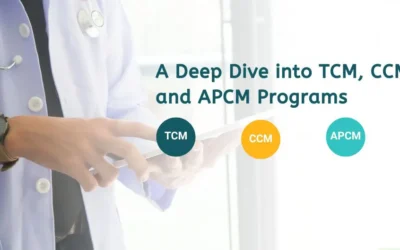
Ways to Achieve Excellence in Chronic Care Management and Remote Patient Monitoring
Recent data by the CDC show that 60% of the US population suffers from at least one chronic disease. These patients will always need their conditions managed, and practices can dedicate weekly hours to research, phone calls, and documentation to meet Medicare reimbursement.
Chronic care management and remote patient monitoring are better options for outsourcing. This way, the practice staff is relieved from the responsibility of educating the patient about the program, enrolling him in the program, and providing monthly care, documentation, reporting, and billing. This can help improve patient outcomes while generating new, highly profitable revenue streams.
Reasons Practices Frequently Underuse CCM and RPM Services
CCM and RPM programs are quite beneficial; however, moving toward their implementation will significantly change your practice. It takes some time as practice staff learns how the processes operate, and the practices only partially optimally use all the services. Several reasons may be the case:
They fail to incorporate CCM and RPM into their care delivery model
Many practices view CCM and RPM as additional services that do not impact their operations. They do not expect the provider to oversee their patients and improve their care.
They fail to adapt their communication practices
It is difficult to change old communication and work organization habits. Many healthcare teams still maintain follow-up appointments with patients independently, even when hiring a third-party provider.
They haven’t explored how to utilize the third-party provider to enhance efficiency
CCM and RPM providers have high monitoring systems, extensive service offerings, and care coordination services. If these resources are not fully integrated, practices will not be able to derive the optimum benefits of the service.
Not efficiently utilizing the services of your CCM/RPM provider means wasting an experienced member of your team who is capable of only doing minimum work. You still do most of the work when you don’t have to.
Harness the Potential of Chronic Care Management and Remote Patient Monitoring
To fully realize the potential of CCM and RPM services, you must look at the provider as part of your organization. The best and most progressive practices we engage with implement new procedures and expect us to provide outstanding care daily, let alone monthly. This mindset shift opens up new avenues for collaboration:
Create an Integrated and Efficient Care Delivery System—Integrate CCM and RPM services in the care delivery model and let your service provider work as part of your practice. When used correctly, they allow for genuine value-based care that decreases hospitalizations and ER visits in your patient population.
Revise Communication Processes—Instead of contacting your patients with chronic illnesses the traditional way, let your CCM/RPM provider handle their monthly follow-ups. At Gen By Gen Health, our care coordinators are well-selected, well-trained, well-mannered, and professional in their approach to patient care, with a special focus on Medicare.
Utilize Proactive Monitoring Strategies– Trust your providers to learn things about your patients that you might not know and use. Our care coordinators are frequently the first to observe the changes in patients’ behavior, including the shifting perspectives and inability to adhere to their treatment plan. Because they monitor patients’ data constantly and conduct routine check-ins, they identify and prioritize the potential problems before they change to the worst emergencies.
Gen By Gen Health's turn-key CCM/RPM solutions ensure compliance and health literacy – improving patient satisfaction and outcomes, increasing revenue, and decreasing staff workload.
To get in touch call us right now at (908)-864-0098 to learn more about our CCM services or you can also book a 30 min free consultation.
You may also like
The Power of Patient Engagement in Driving Better Outcomes
Using patient engagement strategies requires intentional action, but the benefits are significant. People engaged in their care usually follow care plans, control their chronic health problems well, and stay in touch with their doctors. When you start focusing on...
Advance Primary Care Management (APCM) and Who Can Bill For It
Advanced Primary Care Management (APCM), which started in 2025, is the latest care management program from CMS. Unlike older care management plans, it supports every Medicare beneficiary, irrespective of how many chronic conditions they have. As APCM is just starting,...
A Deep Dive into TCM, CCM, and APCM Programs
Transitional Care Management (TCM) is a service that allows Medicare to pay for help given to a person transitioning from a hospital to their home. TCM strives to prevent patients from being readmitted in the first 30 days after they leave the hospital. At this point,...



